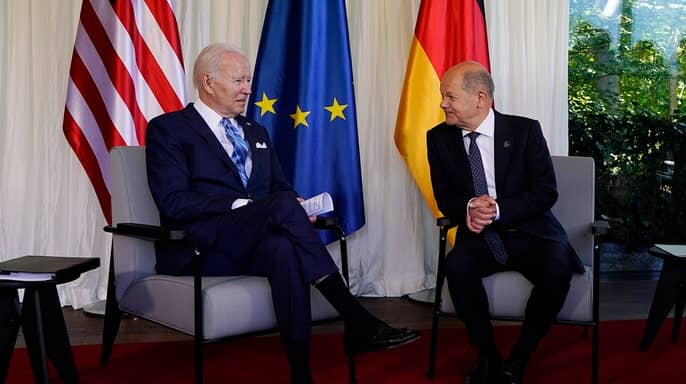News
Biden says G-7 will ban Russian gold imports over war on Ukraine

The Group of Seven (G7) an inter-governmental political forum consisting of Canada, France, Germany, Italy, Japan, the United Kingdom and the United States will prohibit Russian’s from import of Gold in avenging to Moscow’s war against Ukraine, President Joe Biden said.
The G-7 leaders will meet on the summit’s opening day Sunday to discuss how to secure energy supplies and combat inflation, looking to keep the response to Russia’s invasion from hurting global allies hoping to punish the Kremlin.
According to senior Biden administration officials, gold is Russia’s second-largest export and banning imports would make it harder for the country to participate in global markets.
Gold has been the biggest Russian export behind energy in recent years, reaching almost $19 billion or about 5% of global gold exports in 2020, according to the White House.
About 90% of Russian gold exports was consigned to G-7 countries. Among these Russian exports, more than 90%, or nearly $17 billion, was exported to the U.K. The U.S. imported less than $200 million worth of gold from Russia in 2019 and under $1 million in 2020 and 2021.
British Prime Minister Boris Johnson said G-7 countries imposing a ban on Russian gold will “directly hit Russian oligarchs and strike at the heart of Putin’s war machine.”
“Putin is squandering his dwindling resources on this pointless and barbaric war. He is bankrolling his ego at the expense of both the Ukrainian and Russian people,” Johnson said. “We need to starve the Putin regime of its funding.”
According to Britain, the value of gold exports to the Russian elite has spiked in the months since Moscow launched its war as wealthy Russians try to evade Western sanctions.
The ban will be formally announced on Tuesday as the leaders meet for the annual summit.
Biden arrived in Germany’s picturesque Bavarian alps early Sunday morning to join his G-7 counterparts for the annual meeting. The ongoing global impact of Russia’s war on Ukraine is expected to be a key focal point in the discussion. The U.S. president and the international allies strive to present a united front in support of Ukraine.
White House National Security Council spokesman John Kirby said Saturday that the summit will address inflation and other “challenges in the global economy as a result of Mr. Putin’s war — but also how to continue to hold Mr. Putin accountable.”
“There will be some muscle movements,” Kirby said aboard Air Force One on Biden’s flight to Germany.
Price caps on energy designed to limit Russian oil and gas profits that Moscow can use in its invasion will be discussed.
A senior German official said the U.S. suggestion pertaining to price caps was being discussed intensely regarding how exactly it would work and how it would fit with the U.S., EU, British, Canadian and Japanese sanctions regimes.
Officials are also expected to talk about how to ensure commitments to tackling climate change while also addressing energy supply needs.
“There’s no watering down of climate commitments,” Kirby said.
Biden on Sunday will also formally launch a global infrastructure partnership intended to counter China’s influence in the developing world. The president introduced this initiative at last year’s G-7 summit and had named it, “Build Back Better World.”
Kirby said Biden and other world leaders would announce the first projects to benefit from what the administration considers an “alternative to infrastructure models that sell debt traps to low and middle-income partner countries, and advance U.S. economic competitiveness and our national security.”
After the summit concludes on Tuesday, Biden will travel to Madrid to meet with the leaders of the 30 NATO countries to discuss strategy regarding Russia’s war on Ukraine.

